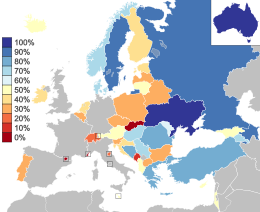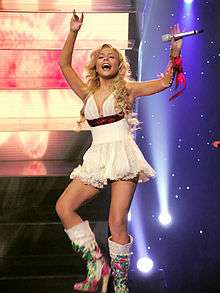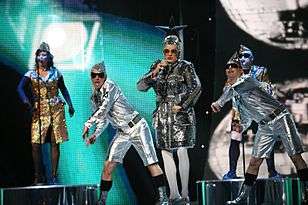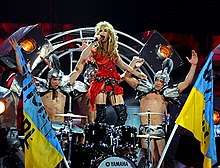Ukraine in the Eurovision Song Contest
Ukraine has participated in the Eurovision Song Contest 15 times since making its debut in 2003. They first won the contest in 2004 with "Wild Dances" by Ruslana, and won again in 2016 with the song "1944" by Jamala, to become the first Eastern European country to win the contest twice. Ukraine hosted the 2005 and 2017 contests in Kiev.

| Ukraine | |
|---|---|
 | |
| Member station | National Public Broadcasting Company of Ukraine (UA:PBC) |
| National selection events | Internal selection
National final
|
| Participation summary | |
| Appearances | 15 (15 finals) |
| First appearance | 2003 |
| Best result | 1st: 2004, 2016 |
| External links | |
| Official website | |
| Ukraine's page at Eurovision.tv | |
Ukraine in the Eurovision Song Contest 2020 | |
Since the introduction of the semifinal round in 2004, Ukraine and Australia are the only countries outside the Big 5 to have qualified for the final of every Eurovision they have competed in (Ukraine were absent in 2015 and 2019 and Australia did not participate until 2015; also 2020 contest was cancelled).[1] Ukraine has a total of six top five placements, with Verka Serduchka (2007) and Ani Lorak (2008) both finishing second, Zlata Ognevich third (2013), and Mika Newton fourth (2011). The only countries with more top five results in the 21st century are Sweden (12) and Russia (11).
History
Ukraine made its debut in 2003, when Oleksandr Ponomariov finished 14th. Ukraine won the contest at the second attempt in 2004, when Ruslana won with the song "Wild Dances", defeating second-placed Serbia and Montenegro by 17 points, 280 to 263.
On 19 September 2014, state broadcaster NTU announced that it would sit out the 2015 Contest because of financial difficulties in relation to the ongoing Ukrainian crisis.[2] However, Ukraine broadcast the contest despite not taking part.[3] On 23 May 2015, Ukrainian Broadcaster NTU pledged to bring Ukraine back to the contest for 2016. On 16 September 2015, it was announced that Ukraine would return to the contest in 2016.[4]
On its return to the contest in 2016, Ukraine became the first Eastern European country to win the contest twice, when Jamala won with her song "1944". The televote was won by Russia and the jury vote by Australia; Ukraine was second in both, but won with an overall total of 534 points, with Australia second with 511 points and Russia third with 491 points. In 2017, as host country, Ukraine was already pre-qualified for the final, however they achieved the worst result for the country – 24th with 36 Points.
In 2019, similarly to previous years, UA:PBC delegated national selection of its Eurovision entry to a private broadcaster STB. Juries and public vote determined Maruv's Siren Song as a winner. In the following days, UA:PBC failed to reach a deal with Maruv due to disagreements on conditions of her taking part in the Ukrainian delegation. UA:PBC then offered the Eurovision ticket to runner-ups in the national selection, Freedom Jazz, Kazka and Brunettes Shoot Blondes who all refused. As result, UA:PBC withdrew from the Eurovision Song Contest 2019 on 27 February 2019.
Since the introduction of the semi-final round in 2004, Ukraine is one of only two countries to have qualified for the final of every Eurovision they have competed in (they were absent from the 2015 and 2019 contests). The other country is Australia, who first entered in 2015.[note 1] Ukraine has a total of nine top ten placements (six top five). The country has an average score of 143 points per contest, 233 if including the semi-finals.
Contestants
The following lists Ukraine's entries for the Eurovision Song Contest along with their result.[5]
1 |
Winner |
2 |
Second place |
3 |
Third place |
X |
Entry selected but did not compete |
| Year | Artist | Language | Title | Final | Points | Semi | Points |
|---|---|---|---|---|---|---|---|
| Oleksandr Ponomariov | English | "Hasta la Vista" | 14 | 30 | No semi-finals | ||
| Ruslana | English, Ukrainian | "Wild Dances" | 1 | 280 | 2 | 256 | |
| GreenJolly | Ukrainian, English | "Razom nas bahato" (Разом нас багато) | 19 | 30 | Host country[lower-alpha 1] | ||
| Tina Karol | English | "Show Me Your Love" | 7 | 145 | 7 | 146 | |
| Verka Serduchka | German, English, Ukrainian, Russian | "Dancing Lasha Tumbai" | 2 | 235 | Top 10 previous year[lower-alpha 2] | ||
| Ani Lorak | English | "Shady Lady" | 2 | 230 | 1 | 152 | |
| Svetlana Loboda | English | "Be My Valentine! (Anti-Crisis Girl)" | 12 | 76 | 6 | 80 | |
| Alyosha | English | "Sweet People" | 10 | 108 | 7 | 77 | |
| Mika Newton | English | "Angel" | 4 | 159 | 6 | 81 | |
| Gaitana | English | "Be My Guest" | 15[lower-alpha 3] | 65 | 8 | 64 | |
| Zlata Ognevich | English | "Gravity" | 3 | 214 | 3 | 140 | |
| Mariya Yaremchuk | English | "Tick-Tock" | 6 | 113 | 5 | 118 | |
| Jamala | Crimean Tatar, English | "1944" | 1 | 534 | 2 | 287 | |
| O.Torvald | English | "Time" | 24 | 36 | Host country[lower-alpha 1] | ||
| Mélovin | English | "Under the Ladder" | 17 | 130 | 6 | 179 | |
| Go_A | Ukrainian | "Solovey" (Соловей) | Contest cancelled[lower-alpha 4] X | ||||
| Go_A | |||||||
Selection process
|
|
Hostings
| Year | Location | Venue | Presenters |
|---|---|---|---|
| 2005 | Kiev | Palace of Sports | Maria Efrosinina and Pavlo Shylko |
| 2017 | Kiev | International Exhibition Centre | Volodymyr Ostapchuk, Oleksandr Skichko and Timur Miroshnychenko |
Awards
Marcel Bezençon Awards
| Year | Category | Song | Performer | Final | Points | Host city | Ref. |
|---|---|---|---|---|---|---|---|
| 2004 | Artistic Award[lower-alpha 5] | "Wild Dances" | Ruslana | 1 | 280 | ||
| 2007 | Press Award | "Dancing Lasha Tumbai" (Данцінґ Лаша Тумбай) | Verka Serduchka | 2 | 235 | ||
| 2008 | Artistic Award[lower-alpha 5] | "Shady Lady" | Ani Lorak | 2 | 230 | ||
| 2016 | Artistic Award[lower-alpha 6] | "1944" | Jamala | 1 | 534 |
Barbara Dex Award
| Year | Performer | Host city | Ref. |
|---|---|---|---|
| 2007 | Verka Serduchka |
Related involvement
Heads of delegation
| Year | Head of delegation | Ref. |
|---|---|---|
| 2007—2016 | Victoria Romanova | |
| 2017—2020 | Oksana Skibinska |
Commentators and spokespersons
| Year | NTU/UA:PBC commentator | STB commentator | Radio commentator | Spokesperson | Ref. |
|---|---|---|---|---|---|
| 2002 | Pavlo Shylko, Mariya Orlova | No broadcast | No broadcast | Did not participate | |
| 2003 | Pavlo Shylko, Dmytro Kryzhanivskyi | Lyudmyla Hariv | |||
| 2004 | Rodion Pryntsevsky | Pavlo Shylko | |||
| 2005 | Yaroslav Chornenkyi | Galyna Babiy | Mariya Orlova | ||
| 2006 | Pavlo Shylko | No broadcast | Igor Posypaiko | ||
| 2007 | Timur Miroshnychenko | Kateryna Osadcha | |||
| 2008 | Marysya Horobets | ||||
| 2009 | |||||
| 2010 | Iryna Zhuravska | ||||
| 2011 | Timur Miroshnychenko, Tetyana Terekhova | Olena Zelinchenko | Ruslana | ||
| 2012 | Oleksiy Matias | ||||
| 2013 | |||||
| 2014 | Zlata Ognevich | ||||
| 2015 | No broadcast | Did not participate | |||
| 2016 | Olena Zelinchenko | Verka Serduchka | |||
| 2017 | Andrii Horodyskyi, Tetyana Terekhova | Zlata Ognevich | |||
| 2018 | Timur Miroshnychenko (all shows) Mariya Yaremchuk (semi-final 1) Alyosha (semi-final 2) Jamala (final) |
Serhiy Prytula | Nata Zhyzhchenko | ||
| 2019 | Timur Miroshnychenko | No broadcast | Did not participate |
Gallery
See also
Notes and references
Notes
- No country has always participated in the final since the introduction of semifinals in 2004. Australia who qualified every year, made their debut in 2015, while Ukraine, despite having always reached the final, skipped the contest in 2015 and 2019. Also, 2020 contest was cancelled due to the COVID-19 pandemic. The "Big Five" (France, Germany, Italy, Spain and United Kingdom) are also not counted in this list since they receive automatic qualification to the final.
- If a country had won the previous year, they did not have to compete in the semi-finals the following year.
- According to the then-Eurovision rules, the top ten non-Big Four countries from the previous year along with the Big Four automatically qualified for the Grand Final without having to compete in semi-finals. For example, if Germany and France placed inside the top ten, the 11th and 12th spots were advanced to next year's Grand Final along with all countries ranked in the top ten.
- In 2012, Cyprus and Ukraine tied with 65 points each in the final. Due to the implementation of the "count-back" tie-breaker rule, Ukraine finished 15th, ahead of Cyprus, because Ukraine received points from more countries in the Final than Cyprus.
- The 2020 contest was cancelled due to the COVID-19 pandemic.
- Voted by previous winners.
- Voted by commentators.
References
- jjs1990 (29 May 2018). "Who has the BEST (and WORST) qualification rate at EUROVISION?". Eurovision Ireland. Retrieved 27 February 2019.
- Nocito, Eric (19 September 2014). "Ukraine withdraws from Eurovision 2015!". ESCReporter.com. ESC Reporter. Retrieved 19 September 2014.
- «Євробачення–2015» українці дивилися найгірше за останні вісім років
- Jiandani, Sanjay (16 September 2015). "Ukraine: NTU confirms participation in Eurovision 2016". esctoday.com. ESCToday. Retrieved 16 September 2015.
- "Ukraine – Eurovision Song Contest". European Broadcasting Union. Retrieved 13 April 2019.
- "Marcel Bezençon Awards". eurovision.tv. Archived from the original on 16 July 2019. Retrieved 8 December 2019.
- Floras, Stella (27 May 2008). "The 2008 Bezençon Awards winners". esctoday.com. Retrieved 8 December 2019.
- "Winners of the Marcel Bezençon Awards 2016". eurovision.tv. 15 May 2016. Retrieved 8 December 2019.
- Adams, William Lee (9 July 2015). "Poll: Who was the worst dressed Barbara Dex Award winner?". Wiwibloggs. Retrieved 8 December 2019.
- "Исполнительные продюсеры "Евровидения-2017" со скандалом покинули проект". lb.ua. 13 February 2017.
- "Украинцы не смогут голосовать на «Евровидении-2019»". atr.ua. 28 February 2019.
- "Yianna Terzi's costume designer for the Eurovision Song Contest". infegreece.gr. 2 May 2018. Retrieved 2 May 2018.
- http://esctoday.com/11406/ukraine_international_team/. Missing or empty
|title=(help) - Украина впервые стала участником конкурса "Евровидение"
- Polishchuk, Tetiana. ""Євробачення" — готовність № 1". The Day. Retrieved 4 March 2019.
- "Украинская песня в ЕВРОвалюте: курс упал… на восток". Detector media (former Telekritika). Kievskiye Vedomosti. Retrieved 4 March 2019.
- "DJ Паша: "У "Євробаченні" переможе темна конячка"". Vysokyi Zamok. Archived from the original on 4 February 2014. Retrieved 23 May 2013.
- Запитання „Детектор медіа”: - Що, на вашу думку, потрібно для того, щоб українське ТБ на належному рівні організувало трансляцію „Євробачення-2005”? (in Ukrainian). Detector media (former Telekritika). 25 May 2004. Retrieved 11 July 2017.
- Zahorodnyi, Oleksandr (20 May 2005). "10 обранців приєднаються до 14 уже відібраних учасників конкурсу Євробачення, фінальне змагання відбудеться завтра" (in Ukrainian). 1+1. Archived from the original on 27 May 2005. Retrieved 24 May 2013.
- Bakhteev, Borys (24 May 2005). "Євробаченню" – п'ятірка. Трансляції – трієчка (in Ukrainian). Detector media (former Telekritika). Retrieved 24 May 2013.
- Галина Бабій (in Ukrainian). Ukrainian Radio. Retrieved 24 May 2013.
- Busa, Alexandru (13 May 2011). "Ruslana to announce the Ukrainian votes". ESCToday. Archived from the original on 15 May 2011. Retrieved 22 February 2020.
- Katsun, Yuliya (11 May 2019). ""Евровидение-2019": кто будет комментировать конкурс на СТБ и UA: Перший". KP.ua (in Russian). KP. Retrieved 11 May 2019.
External links
- Points to and from Ukraine eurovisioncovers.co.uk
- Ukraine in the Eurovision Song Contest - 2010 eurovision-ukraine.com
_cropped.jpg)








